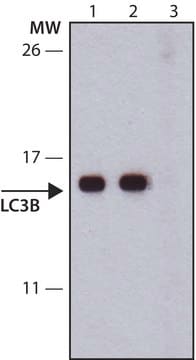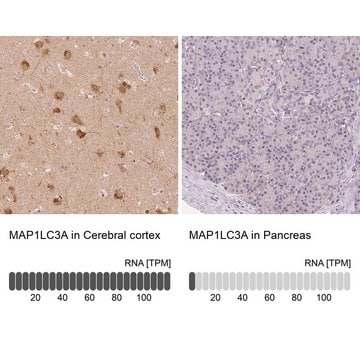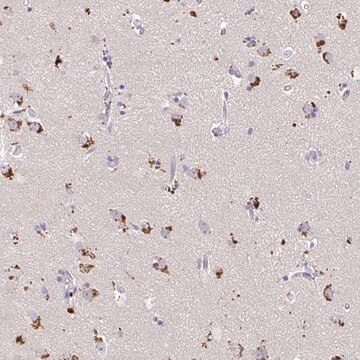L8918
Anti-LC3 antibody produced in rabbit
~1 mg/mL, affinity isolated antibody, buffered aqueous solution
Synonym(s):
Anti-Lc3, LC3 Antibody - Anti-LC3 antibody produced in rabbit, Lc3 Antibody, Anti-MAP1 light chain 3-like protein 1, Anti-MAP1A/1B light chain 3A, Anti-MAP1A/1BLC3, Anti-MAP1A/MAP1B LC3A, Anti-MAP1ALC3, Anti-MAP1BLC3, Anti-MAP1LC3A, Anti-MAP1LC3B, Anti-Microtubule-associated protein 1 light chain 3 alpha, Anti-Microtubule-associated protein 1 light chain 3 beta, Anti-Microtubule-associated proteins 1A/1B light chain 3
About This Item
Recommended Products
biological source
rabbit
conjugate
unconjugated
antibody form
affinity isolated antibody
antibody product type
primary antibodies
clone
polyclonal
form
buffered aqueous solution
mol wt
antigen 16-18 kDa
species reactivity
mouse, human, rat
packaging
antibody small pack of 25 μL
concentration
~1 mg/mL
technique(s)
immunohistochemistry: suitable
immunoprecipitation (IP): 5-10 μg using extracts of human U87 cells
western blot: 1-2 μg/mL using whole extracts of rat and mouse brain
UniProt accession no.
shipped in
dry ice
storage temp.
−20°C
target post-translational modification
unmodified
Gene Information
human ... MAP1LC3A(84557) , MAP1LC3B(81631)
mouse ... Map1lc3a(66734) , Map1lc3b(67443)
rat ... Map1lc3a(362245) , Map1lc3b(64862)
General description
Immunogen
Application
- western blotting
- immunofluorescence
- immunohistochemistry
- filter retardation assay
- immunocytochemistry
Immunofluorescence (3 papers)
Immunohistochemistry (1 paper)
Western Blotting (21 paper)
Biochem/physiol Actions
Physical form
Storage and Stability
Disclaimer
Not finding the right product?
Try our Product Selector Tool.
recommended
Storage Class Code
10 - Combustible liquids
WGK
WGK 3
Personal Protective Equipment
Certificates of Analysis (COA)
Search for Certificates of Analysis (COA) by entering the products Lot/Batch Number. Lot and Batch Numbers can be found on a product’s label following the words ‘Lot’ or ‘Batch’.
Already Own This Product?
Find documentation for the products that you have recently purchased in the Document Library.
Customers Also Viewed
Articles
High titer lentiviral particles for LC3 variants used for live cell analysis of cellular autophagy.
Our team of scientists has experience in all areas of research including Life Science, Material Science, Chemical Synthesis, Chromatography, Analytical and many others.
Contact Technical Service














